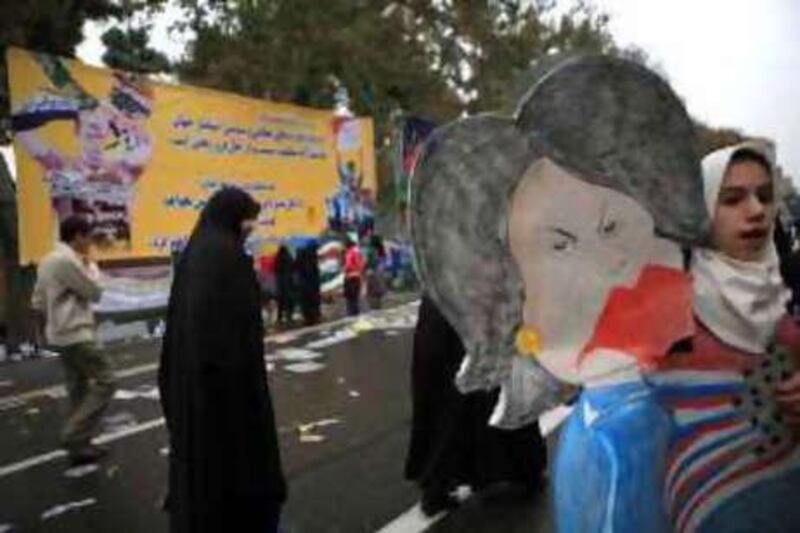TEHRAN // Iranian officials have so far only cautiously welcomed the the election of Barack Obama despite the president-elect's promises of direct talks with Iran. They did, however, say the Democrat's victory is an obvious sign of the failure of the Bush administration. "[Iran] will welcome fundamental, just and real changes in policies and behaviours particularly in this region," Mahmoud Ahmadinejad, Iran's president, said in a message to Mr Obama yesterday carried by the state-run IRNA. Mr Ahmadinejad, who had repeatedly predicted the African-American senator would not be allowed to enter the White House by the American establishment, expressed hope Mr Obama would give priority to "people's real interest and justice" over the demands of "an "unsatiable and corrupt minority". Manouchehr Mottaki, Iran's foreign minister, also hoped Mr Obama would bring about change. "Obama's election as the new US president indicates that the American people wholeheartedly support fundamental changes in the bedrock of US policies," he said. Gholam Ali Haddad Adel, a lawmaker and former parliament speaker, said Mr Obama's election was essential to rescuing the US's image. "Americans had to change their policy to save themselves from the quagmire that Bush has created for them. Obama's victory [demonstrates the reality of] the US defeat around the world," Mr Haddad-Adel said, adding that Mr Obama must undo George W Bush's mistakes to prevent the United States from "sinking deeper into internal crisis and attracting more hatred on the international scene". On Monday, the 29th anniversary of the takeover of the US Embassy by Iranian students was celebrated in front of the former mission in Tehran. There was the usual demonstration with speeches and chanting against the United States as US flags were torched. After the takeover in 1979, the embassy was named the "Den of Spies" by the students and the incident led to the cutting of diplomatic relations between the United States and Iran. Relations have continued to deteriorate since and Iran was even named as a member of the "axis of evil" by Mr Bush in his 2002 State of the Union Address. Mr Obama has promised to talk to Iran, directly and without preconditions. He has also said it would be possible to ease sanctions and consider allowing Iran to enter the World Trade Organization if the Islamic Republic gives up its nuclear programme. Mr Obama's proposal to talk to Iran without setting preconditions has been greeted with scepticism by Iranian hardliners who believe he is offering to talk only to increase diplomatic pressure. "All those who believe Obama's presidency is advantageous to Iran or consider him less dangerous than a Republican must seriously consider the fact that Obama is only going to use more complex methods [against Iran] and that his goals are no different from his predecessors," said an editorial in the hardline Kayhan newspaper. Elaheh Koulaie, a reformist former lawmaker, was less sceptical but said expecting a change in the principles governing US policy on Iran was not realistic. Neither Republican nor Democrat presidents have the will to change these principles, Ms Koulaie said, especially with regard to Iran's nuclear programme. However, Sadegh Zibakalam, a professor of political science at Tehran University, said while he believes Mr Obama will offer Tehran an olive branch he is not optimistic the latter will accept it. "Antagonism to the US has ideologically become an element of the Islamic republic's identity. One wonders what there will be left to talk about if relations with the US are normalised - like relations with European countries and other powers," Prof Zibakalam was quoted as saying by an Iranian news website. Should Iran reject an overture from Mr Obama, the American public will be more receptive to the government taking a tough stance on Iran and possibly further sanctions, Prof Zibakalam said. Others were more optimistic, saying the replacement of the neo-conservative Mr Bush by a Democrat is a great opportunity for the United States and Iran to restore relations. "If there is a will among Iranian decision-makers to improve relations with other countries including the US, they can exploit this opportunity," Ebrahim Yazdi, leader of the Freedom Movement of Iran party and foreign minister at the time of the take over of the US Embassy, was quoted as saying by Etemad Melli newspaper. A positive first step would be for Mr Ahmadinejad to congratulate Mr Obama, Mr Yazdi said. The Iranian public is also cautiously optimistic. According to a poll run by Iran newspaper, the mouthpiece of the Iranian government, before the release of the election results, 44.66 per cent of the respondents to the poll believed US foreign policy will change when Mr Obama takes office while 33.98 per cent thought the same policies would continue. "One must not forget that Democrats sound less aggressive than the Republicans, but they have never been much friendlier to us," said Hassan Esmaili, 46, an architect. "It should be appreciated if they change their attitude towards us but I have no high hopes of the hostility between Iran and the US coming to a close any time soon," he said. "There is simply too much history and too many reasons for both sides not to be able to overcome this hostility." Others said Mr Obama was not the only factor in bringing the United States and Iran closer together. "There is no hope of better relations if Mr Ahmadinejad is re-elected next June because he hates the US," said Mohammad Abasian, 35, a businessman. "On the other hand, things can even be worse if a reformist is elected to the post because rapprochement by a reformist president will never be allowed by powerful hardline bodies." msinaiee@thenational.ae
A reluctant Iran greets election of Obama
As Iranians celebrate the anniversary of the US Embassy takeover in 1979, few believe the relationship between the nations will improve.

More from the national




